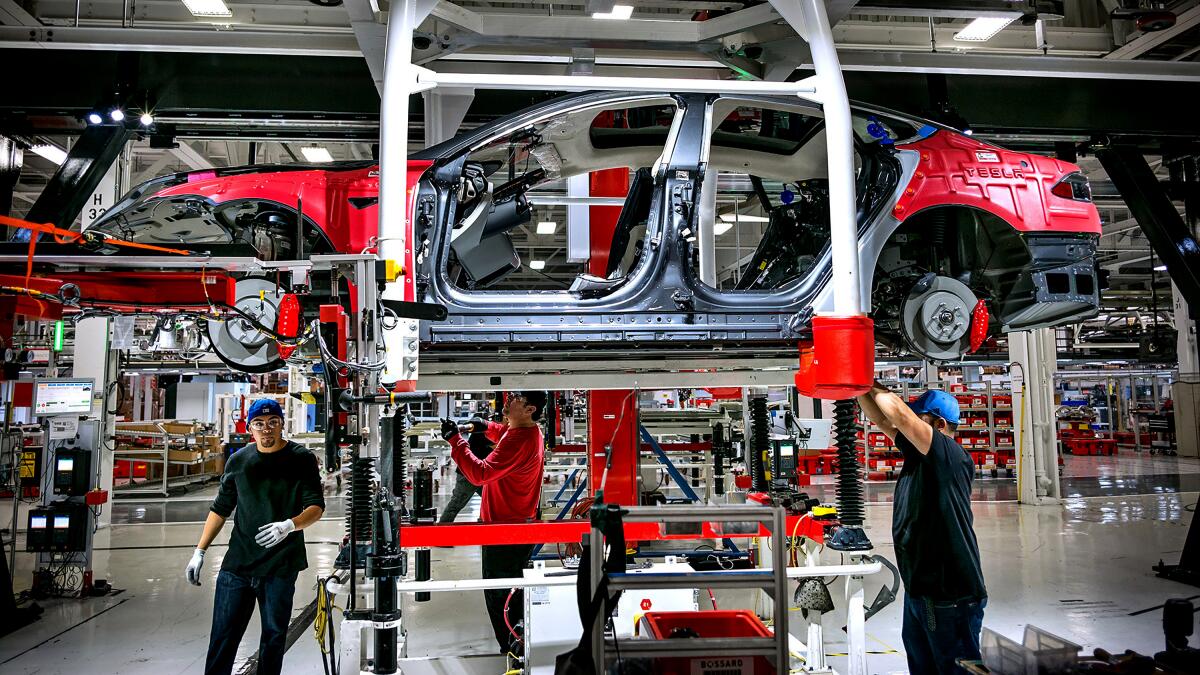Tesla shares fall despite profit beat

- Share via
Tesla Inc. reported a higher-than-expected seventh consecutive quarter of profit on strong demand for its top-selling Model 3 sedan but left its multiyear outlook for 50% growth in deliveries unchanged.
Profit at Elon Musk’s electric vehicle company rose to 93 cents a share on an adjusted basis, the Palo Alto-based automaker said Monday. That beat the 80-cent average of analysts’ estimates.
The results kick off a year in which Tesla will be expanding operations on three continents, including completing new factories in Austin, Texas, and Berlin. The company indicated it expects 50% annual growth in deliveries “over a multiyear horizon,” which is consistent with its previous wording.
“It’s all good, but there’s not a lot of news and it wasn’t a blowout,” said Gene Munster of Loup Ventures. “Everything happened that people thought would happen.”
Tesla fell 1.9% to $724.01 in aftermarket trading. It closed the session up 1.2% to $738.20.
The company delivered more than a half-million cars in 2020 and reported deliveries of 184,800 cars worldwide in the first quarter, topping the last quarter of 2020 by about 4,000 vehicles.
The EV market leader faces a new wave of competition from several new models being launched this year by startups such as Rivian Automotive Inc., backed by Amazon.com Inc., and established automakers including General Motors Co. and Volkswagen.
Tesla sought to assure investors in its quarterly release by noting growing demand for EVs and its efforts to rapidly expand production capacity. “As more OEMs [original equipment manufacturers] join our mission by launching EVs, we believe consumer confidence in EVs continues to increase and more customers are willing to make the switch,” it said in a statement.
Tesla’s first-quarter revenue grew 74% to $10.39 billion from January through March, close to analysts’ estimates for $10.41 billion. Sales of regulatory credits rose to $518 million this quarter, up from $401 million in the last quarter of 2020.
The company earns more money selling those credits to other automakers than it does from its core business of making and selling cars. That’s a potential issue for Tesla as more established carmakers start to offer their own lineup of EVs — and may not need to buy as many credits in the future despite tightening carbon-emissions standards globally.
Tesla indicated it is getting better and more efficient at building cars. Its automotive gross margin of 26.5% came in above the Bloomberg consensus of 24.2%. The company attributed the boost to cost-cutting that outpaced lower average selling prices.
Tesla also reported a $272-million gain on “digital assets” after making a $1.5-billion investment in the cryptocurrency in February. The company reported $101 million in income from the investment.
Bitcoin gained as much as 1.9% and traded above $54,000 after Tesla’s chief financial officer reiterated the company’s commitment to the cybercurrency.
“We do believe long-term in the value of Bitcoin,” CFO Zachary Kirkhorn said on a conference call with analysts. “It is our intent to hold what we have long term and continue to accumulate Bitcoin from transactions from our customers as they purchase vehicles.”
Bloomberg writers Gabrielle Coppola, Ed Ludlow and Esha Dey contributed to this report.






